U prvoj prolećnoj akciji ekološke kampanje “Oplaneti se! Recikliraj”, približno 250 građana Vučja i okolnih mesta prikupilo je 1 tonu PET ambalaže (20.000 plastičnih flaša), koja je u saradnji sa kompanijom Porr – Werner & Weber d.o.o. otpremljena u reciklažni centar “Željkovac”.
Događaj ispred Doma kulture u Vučju organizovalo je Udruženje građana “Porečje” iz Vučja, član Zelene liste Srbije, a realizaciju je obezbedio Balkanski fond za lokalne inicijative (BCIF) u saradnji sa Institutom za održive zajednice (ISC) i Mladim istraživačima Srbije i uz finansijsku podršku Američke agencije za međunarodni razvoj (USAID).
Na samoj akciji potpisan je Memorandum o saradnji na zaštiti životne sredine na teritoriji grada Leskovca koji su potpisali Gradska uprava za zaštitu životne sredine grada Leskovca, mesna zajednica Vučje, JKP Komunalac, JP Srbija šume, Komunalna policija, kompanija Porr – Werner & Weber d.o.o., TV Leskovac, TV K1 i Udruženje građana Porečje iz Vučja, koji će doprineti boljem upravljanju otpadom u zajednici.
Otpad su prikupljali i đaci Osnovne škole “Bora Stanković”, a najuspešniji sakupljači nagrađeni su majicama sa ekološkim porukama.
Osim toga, Udruženje građana „Porečje” iz Vučja od pre nekoliko meseci započelo je i akciju primarne selekcije otpada, tokom koje je među 100 domaćinstava u pet mesnih zajednica opštine Leskovac podelilo kese za papirni i plastični otpad, koji se nakon razvrstavanja u domaćinstvima, kamionima kompanije Porr - Werner & Weber odvozi u reciklažni centar „Željkovac”.
Realizacijom aktivnosti usmerenih ka prikupljanju otpada, kroz kampanju Oplaneti se! Recikliraj, Zelena Lista Srbije i Zelena inicijativa žele da povećaju učešće gradjana/ki, reciklažnih biznisa i lokalnih institucija u oblasti prikupljanja reciklažnih sirovina.


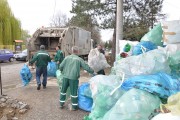
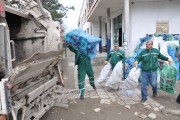
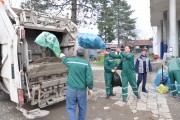
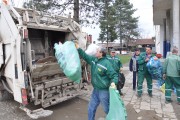
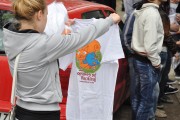
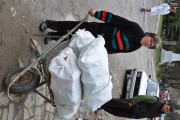
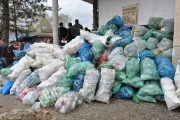
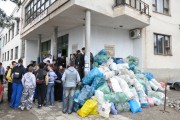
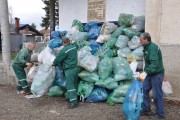














If you community has a reccilyng program, start by making sure you have the appropriate blue or green bin and be sure use it every week. Even if you start with just a few items, your neighbors will see that you care and perhaps a trend will start. Read the directions on the bin as to what is acceptable in your community’s curbside pick-up program. Cardboard boxes often are, while pizza boxes are not, for example. (My apartment neighbors don’t seem to get that, so I end up sorting through their garbage quite often. We also save our cardboard egg cartons I refuse to buy styro cartons and donate them to local food banks.) Check your local directory for commercial reccilyng centers in your area, if you do not have a community reccilyng program already in place. (If you don’t, it’s time you called your local politicians and insisted soemone get this moving.) Your nearest private recylcing centers should take plastics of all types (codes 1-7), paper and cardboard, bottles of all colors (green, brown, etc.) and steel/tin as well as aluminum cans. Of course, remember the old 3 Rs of reccilyng has now grown into 4Rs: REDUCE your own consumption/purchase of non biodegradable objects and anything that comes in non biodegradable packing materials. The new R is to REFUSE to purchase things in wasteful or unrecyclable packing. Your greatest power may be in your pocketbook, but don’t forget to let your local merchants know WHY you are NOT buying certain products or using paper much less those evil plastic sacks. (Be prepared by keeping canvas sacks in your car so you can avoid the excuse of just having to make a small pick-up shopping trip.) You also have the right and the voice to address these companies directly. Write to their consumer affairs divisions and cc their CEOs about excessive packaging, plastic bags/containers, etc. The trick, of course, is to buy fresher and fresher whole foods with less and less packaging. All things being equal, I buy produce with the least amount of packaging possible. Visit your local farmers’ market and bring your own sacks to aid in this effort, but be sure to still educate your local supermarkets. AVOID polystyrene/styrofoam altogether. I bring my own container when we go to restaurants and envision there might be take outs. Ditto for carrying your own refillable water bottle and coffee/tea/yerba matte mug. (I have lived in a Third World country overrun by styrofoam waste that has NO WHERE to go besides the ocean, reef and the nation’s very limited landmass. Their future is not very pretty.) If you don’t like the taste of your local tap water and use it as an excuse for buying bottled water, buy a filter pitcher and chill the H2O before drinking. There is no excuse for the abominable mountains of plastic bottles discraded by our so-called health and environmentally-conscious generations. You can also recycle your clothing by donating anything usable. (Remember, your standard for usable may be somewhat higher than on the receiving end, but that does not mean you should drop your junk there either.) Likwise for buying gently used clothing for yourself. Tear up unrecyclable fabric and use in place of PAPER towels, PAPER napkins or SPONGES. It is less harmful to wash a daily use rag than to keep buying paper products (even recycled ones). Recycle your printer’s toner cartridges as well as your old electronics. If you don’t know where to do that, call a local non profit like Goodwill or Easter Seals and see if they can point you towards a needy recipient. Recycle your home/office printer paper, of course, but start by reducing what is printed. Just today we saw a story about green printing software that scans your documents and reformats them to cut out all the nonsense that no one ever reads anywhere from 20 40 % of the pages that run through our machines. It seems worth the $35 it’ll cost to download. Oh, and then there’s composting reccilyng your food waste. If you are a non gardener perhaps one of your neighbors, a local school or a nearby nursing home might have a garden and be willing to take your dumpings every week. This will also reduce your overall trash load. Thanks for caring enough to ask this question.